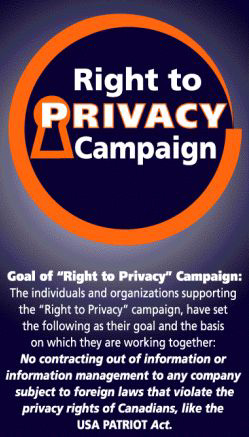 |
British Columbia is outsourcing desktop computer support for all government employees. The company awarded the contract: IBM.
Public workers, represented by the BCGEU, have gone on record as expressing concern that the privacy rights of all British Columbians could very well be in jeopardy.
IBM will not only gain access to most of the confidential files handled by the provincial government — the company could be compelled to share your confidential information with the FBI, under the sweeping new provisions of the USA Patriot Act.
The BCGEU has filed a complaint with the office of the B.C. Privacy Commissioner on the issue of citizens’ rights to privacy in the outsourcing of government services, and has also initiated legal action to overturn the outsourcing of confidential information services to private firms.
In addition to the undertaking of the BCGEU, a broad coalition of community groups has launched a Right To Privacy campaign, setting as their goal “no contracting out of information or information management to any company subject to foreign laws that violate the rights of Canadians.”
As of this writing, the provincial government continues its plans to contract out the administration of the Medical Services Plan and Pharmacare to Maximus Inc., an American multinational corporation, by the end of August.
According to an article written by Michael Geist — the Canada Research Chair in Internet and E-commerce Law at the University of Ottawa — and published in the Toronto Star …
A review of both Canadian and U.S. law leaves little doubt that U.S. law does grant law enforcement authorities the power to compel disclosure of personal information without notifying the targeted individual that their information is indeed being disclosed (in fact, disclosing the disclosure is itself a violation of the law).
The troubling truth is that this is not strictly a Patriot Act issue. There are several U.S. investigatory powers that grant similar authority. These include grand jury subpoenas and national security letters, both of which predate the Patriot Act.
Moreover, the application of these laws is not limited to U.S. companies but actually applies to any company with sufficient U.S. connections such that it could find itself subject to the jurisdiction of the U.S. courts. Several cases, including one involving the Bank of Nova Scotia, have found that the U.S. courts are entitled to apply U.S. criminal law, even in the face of a conflicting obligation under the foreign law. This is true both for U.S. companies operating subsidiaries in foreign countries as well as for foreign companies with U.S. subsidiaries.
Since Canada’s, and British Columbia’s, privacy laws are unlikely to meet the blocking statute standard, it seems likely that U.S. law enforcement authorities may indeed compel the disclosure of Canadian data.
B.C.’s Privacy Commissioner, David Loukidelis, wants to know what you think about the provincial Liberals’ plan to contract out the administration of the Medical Services Plan, Pharmacare and other public services to American multinational corporations.
Submissions must be clearly labelled “Submission on the USA Patriot Act” and mailed to P.O. Box 9038, Stn. Prov. Govt., Victoria, B.C. V8W 9A4, or sent by fax to 250-387-1696, or submitted by e-mail to